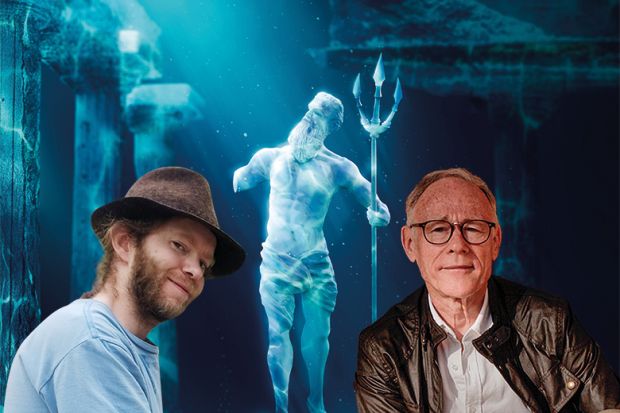Graham Hancock’s call for archaeologists to debate his belief in a lost Atlantis-style civilisation has long been ignored by those wary of giving credence to his outlandish ideas – until now.
The presenter of Netflix’s hit series Ancient Apocalypse has accepted an offer from Cardiff University archaeologist Flint Dibble to discuss his theories on the Spotify podcast The Joe Rogan Experience, which has hosted the controversial British journalist on several occasions.
The decision to engage directly with Mr Hancock, who claims that survivors from an ancient society destroyed by floods 13,000 years ago transported their technology to the four corners of the world, seeding civilisations in Egypt, Mesopotamia and central America, marks a departure for a discipline that has long dismissed his “pseudo-archaeology”.
But the enormous popularity of Ancient Apocalypse, in which Mr Hancock insists that archaeologists choose to ignore evidence for his alternative theories, meant the policy of non-engagement was no longer sustainable, said Dr Dibble.
“We live in a world where the ideas of pseudoscience thinkers have a large platform and are gaining in popularity. They have a powerful voice, so we have to speak out and share what we know in a plausible and convincing manner,” said Dr Dibble.
“Catastrophism appeals to a dystopian 21st-century mentality – it’s entertaining but also seems possible as we’ve had world wars and heard about the potential of nuclear weapons or climate change to destroy life.
“Hancock’s willingness to say ‘archaeology is wrong’ also appeals – it’s anti-expert, anti-intellectual and offers an alternative way of thinking about history.”
The US-born archaeologist hopes the discussion will push back on some of the theories pushed by Mr Hancock, who claims that scholars have deliberately left tombs unopened for fear of finding evidence that contradicts orthodox ideas on prehistory.
“Our goal is to investigate the past in ways that are ethical and legal – sometimes there is an existing monument that a government wants us to preserve on an archaeological site, so we can’t just dismantle it to investigate something that might be there,” explained Dr Dibble, who said the historic locations in Mexico, Indonesia and Turkey shown on Ancient Apocalypse have been explored extensively by academic archaeologists, often for decades.
Debunking Mr Hancock’s central claim that a lost civilisation is partly responsible for the science and technology developed separately across the world was also important, he continued. “It’s a problematic idea which appeals to racists and the right wing because it strips credit from indigenous people for their cultural heritage – it’s saying, ‘They can’t be responsible for their monuments or art.’ Even if I don’t believe Graham Hancock is racist, it feeds into this narrative.
“These ideas of Atlantis and hidden knowledge withheld by the experts are nothing new – they date from the 19th century, so I probably won’t change some people’s minds but maybe I can say what archaeology is, what we’ve found and what is relevant.”
POSTSCRIPT:
Print headline: ‘We can’t ignore pseudoscience’
Register to continue
Why register?
- Registration is free and only takes a moment
- Once registered, you can read 3 articles a month
- Sign up for our newsletter
Subscribe
Or subscribe for unlimited access to:
- Unlimited access to news, views, insights & reviews
- Digital editions
- Digital access to THE’s university and college rankings analysis
Already registered or a current subscriber? Login











